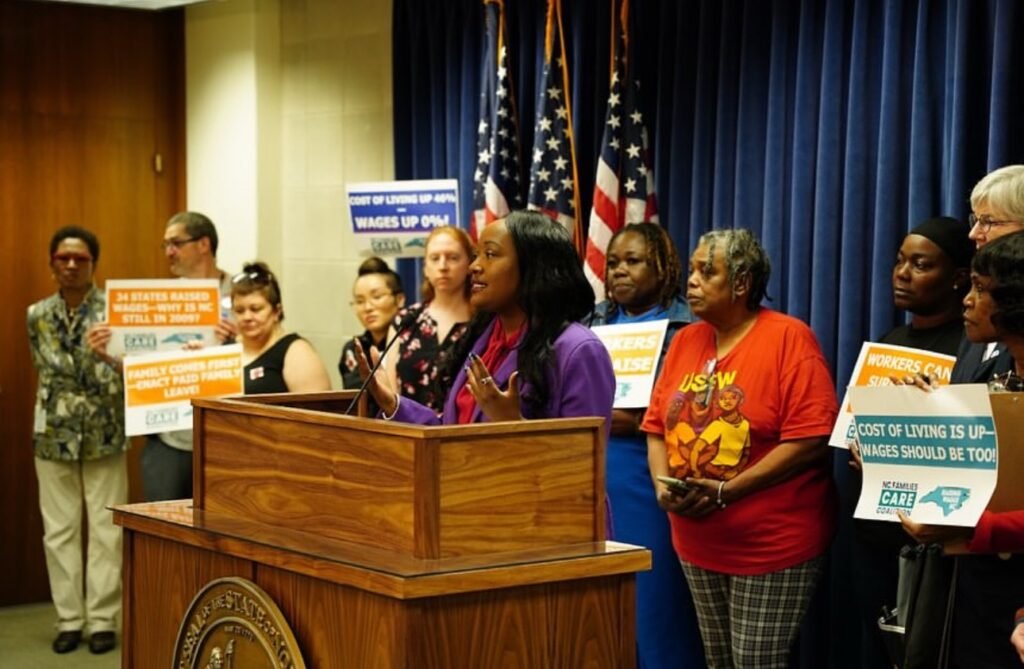In a concerted effort to address the economic challenges confronting North Carolina’s workforce, Democratic legislators have unveiled a series of proposals aimed at enhancing worker protections, increasing wages, and instituting comprehensive paid leave policies. These initiatives, introduced during recent press conferences at the Legislative Building in Raleigh, underscore a commitment to improving the financial stability and well-being of the state’s labor force.
Advocating for Paid Family Leave
Senate Democratic Leader Sydney Batch of Wake County spearheaded the push for the North Carolina Paid Family Leave Insurance Act (Senate Bill 480), emphasizing the critical need for paid leave among workers. Highlighting a poignant case of a mother compelled to leave her premature child in the hospital to maintain employment, Sen. Batch remarked, “In a society that is so well-resourced, it is outrageous that we don’t provide paid leave for individuals, and that is something that absolutely needs to change.”
The proposed legislation seeks to provide up to 12 weeks of paid time off for significant life events, including the birth or adoption of a child, serious personal illness, or caring for a family member with a serious health condition. The program would be financed through modest weekly contributions from both employers and employees, aiming to extend coverage to a broad spectrum of workers, including small business owners, self-employed individuals, and part-time employees.
Pushing for Minimum Wage Increases
In a parallel initiative, Democratic lawmakers introduced bills designed to raise the state’s minimum wage, which has remained unchanged since 2009. The Economic Security Act (House Bill 339 and Senate Bill 326) proposes an increase to $22 per hour, while the Fair Minimum Wage Act (House Bill 353) outlines a gradual elevation to $18 per hour by 2030.
Senator Natalie Murdock, representing Chatham and Durham counties, articulated the rationale behind these measures: “The people of North Carolina work hard and put their all into everything that they do. They deserve to be paid every single dime that they are worth. They are worth more than what they are getting today.”
Beyond wage increases, these proposals encompass provisions for paid sick days, enhanced workplace safety protections, and the reinstatement of the Earned Income Tax Credit (EITC). Sen. Murdock highlighted the urgency of these reforms, noting, “More than half of Americans are just one paycheck away from homelessness. That is unacceptable. We can and we must do better for our state.”
Economic Implications and Legislative Outlook
Advocates argue that elevating the minimum wage could stimulate the state’s economy by increasing consumer spending. The North Carolina Justice Center estimates that a $15 minimum wage could inject approximately $4.5 million into the economy. Furthermore, proponents of paid leave contend that such policies would reduce employee turnover and enhance productivity, yielding benefits for both workers and businesses.
Despite the potential advantages, these legislative efforts face significant hurdles in the Republican-controlled General Assembly, where similar proposals have encountered resistance in the past. Nonetheless, Democratic lawmakers and worker advocacy groups remain steadfast in their pursuit of these reforms, emphasizing the moral and economic imperatives of supporting North Carolina’s workforce.
The introduction of these legislative measures reflects a broader movement to address income inequality and improve labor conditions in North Carolina. As the debate unfolds, the outcomes of these proposals will have profound implications for workers across the state, particularly in communities like Durham, where economic disparities are acutely felt.
For comprehensive coverage of this and other legislative developments affecting North Carolina’s workforce, readers are encouraged to consult reputable news outlets and official legislative resources.












